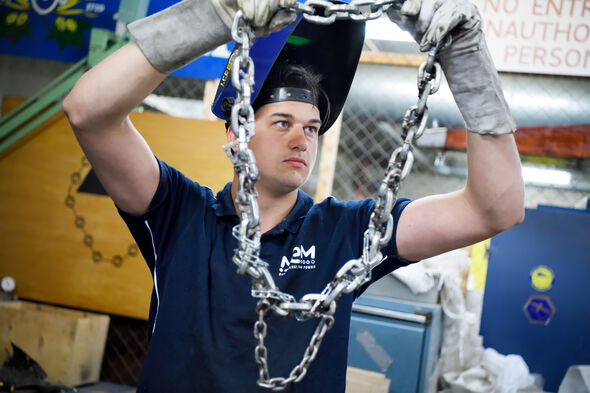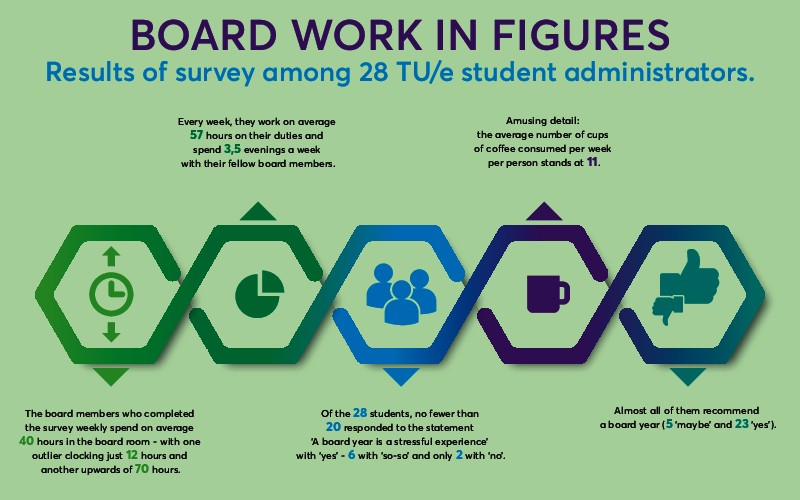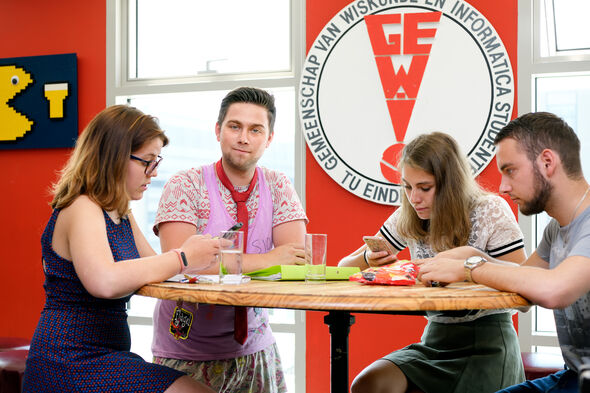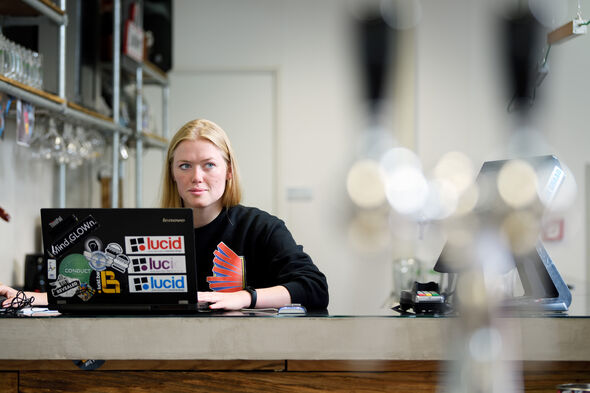
Sitting on a study association board; the stress and skills
A board year for a study association, that is hard work. Very hard work, sixty to eighty hours a week is not exceptional. It means giving up a fair amount as well; your hobbies get knocked into the background and you see less of your family and friends. So why in heaven's name would you do it? And what is all that time spent on? Cursor delved into board life and discovered that happily it has plenty of positive aspects.
“After a year of being a board member, I can finally say that I’m ‘bestuur-af’, which means I have a lot more time on my hands to reflect on the past year of my life and how I’ve changed over the course of it all.” Hugo Bezombes, student Sustainable Innovation, looks back on his board year.”
“Initially, the reason I wanted to do a board year was that I didn’t feel comfortable with making life choices and decisions given my limited life experience. For me, a board year was an opportunity to get to know myself better and (at least I thought) to take a step back from studying in order to make a more informed decision about what the next step in my life should be. The choice of where to do that year was quite simple: the place that had welcomed me in my first year: Intermate.”
“Getting up to speed for the board year was particularly hard and apart from knowing that it was going to be difficult, I had no idea what to expect. One thing that happened instantly was that I had too much on my plate and struggled to meet the expectations of my function, my friends and my courses.”
“It turns out that time really is one of the things you can’t stretch. Eventually I had to give up doing some things I enjoyed, like watching movies and I was writing less, doing less sport and seeing less of my friends. While it was difficult, I did learn which things were really essential to my well-being. By phasing them out, crashing and learning that I couldn't live without them, I got a pretty good idea of the recipe for my happiness. I think that overcoming this adversity made me a much more balanced person overall and better able to allocate my time.”
Survey
Other board members have similar experiences, according to sources including an extensive survey we held among them. We received 28 responses from these administrators of the 10 study associations at TU/e.
Let's begin with why they decided to do a board year at all. Three reasons jump out: Some were keen to (further) develop certain professional skills, others conversely wanted to polish up their social skills, and various administrators were keen to do something in return for their association. “Because I'm crazy about my association” was an often-cited reason.
Almost without exception, these administrators have struggled with difficulties and choices. While they have had - or have managed to make - some time for hobbies, sports, family and friends, each and every one of them has dropped one thing or another in the past year. For one person that was a part-time job, for another a sport, and various students observed that they were able to spend less time on their courses than they had anticipated - or had to opt for the slightly easier courses. Most of their time is taken up with board duties.
When asked what they have found most difficult during their past year in office, they produced various answers. A selection:
‘Having no free evenings can be really exhausting.’
‘Not being available for the people around me quite often.’
‘Always voicing the opinion of the board instead of you own can be quite hard.’
‘You are always in your role as board member, even if you just want to enjoy a night out.’
‘To choose between what the association wants and expects from you and what you actually want yourself.’
‘Always having the feeling that you could achieve more if you would just spend a few more hours on the tasks that you're doing.’
24 hours at CHEOPS
What kind of things do the administrators do? The short film ‘24 hours at CHEOPS (Built Environment)’, made for us by video reporter Collin Wagenmakers, gives a good impression:
The Federation of Study Associations Eindhoven (FSE, the umbrella organization of the study associations) is also aware of just how busy the administrators - increasingly - feel they are.
Vice president Thomas Wamsteker: “Without a doubt, the range of tasks involved and the workload of the administrators have changed somewhat. As we all know, student numbers at TU/e have increased considerably, creating a knock-on effect on the membership numbers of the study associations. One consequence of this is that more, larger and more professional committees have come into being, and these naturally take up more of the boards' time. All in all the administrators must ensure that all duties can continue to be properly fulfilled while their association is growing rapidly in both size and professionalism. For the rest, activities related to career development are increasingly being dropped in the laps of the associations. Just think of lunchtime lectures and excursions.”
FSE president Tom van Teeffelen: “We are raising the issue of how very busy they are in several ways. We are keeping in touch with the University Council and the departments also know about the issue. The associations have good connections with Education & Student Affairs. As to whether they are too busy? The boards often really enjoy their work and have found ways to deal with just how busy it is. By outsourcing things, for example, including to committees. That the work pressure is high is undeniable. An important aspect of this is the appreciation shown to the boards. From the associations, they receive a great deal of appreciation for their work, certainly from the members. But I do wonder whether they get enough recognition from TU/e. When new resolutions are passed, the work pressure experienced by employees is now being borne in mind. Perhaps in this same way we could take more account of just how busy the student boards are.”
Increase
The student factions too have the work pressure - of both the study associations and other associations - on their radar. Eva Hanckmann, chairperson of the Eindhoven Student Council: “We are certainly hearing more often how busy the administrators are and it's a matter we're keeping tabs on. With Groep-één, we drew up a proposal for a tuition fee waiver for board members and a review of the Student Financial Support Fund. This has resulted in an increase in the monthly payment made from the Student Financial Support Fund to administrators. Among other things, we hope this will ease their work pressure, because they won't need to take on a job alongside their board duties to get by.” The amount of the grant per month is currently 290 euros. With the promised increase of 125 euros, this amount will rise to 415 euros in the coming academic year. Moreover, there will be an additional hundred grants, which the umbrellas can share out among ‘their’ associations.
Facts and figures: board grants
This academic year a total of 1,000 months are available to all associations that are entitled to a board grant in 2017/2018. Next academic year this number will be 1,100. The study associations are entitled to 522 months of board grant in total and they have to share out these months between themselves, in consultation with the Federation of Study Associations Eindhoven (FSE). The first step is to check whether a student has enough credits. Then it is decided in meetings how many months each board will get.
Next academic year all students with a committee officer grant will get 125 euros in addition to the standard monthly amount. The grant amount depends on whether the student gets an additional grant from DUO. A student may receive at most nine months of board grant per year, and over the entire period of his or her study at TU/e no more than fourteen months of board grant.
According to Yoram Meijaard, fraction secretary of Groep-één, ‘a board year has always been busy, but it is now more busy because membership numbers have increased and this brings added responsibilities’. “The lines are short and we hear about the problems arising. With increasing frequency, we are hearing of administrators who ‘drop out’, the consequence of which is that the other board members have to take over their responsibilities. This doesn't help the work pressure and is, of course, terrible for the student in question.”
Groep-één is in discussion with ESA staff about the student welfare action plan. Meijaard: “We helped write it. If at TU/e we can prevent our administrators from dropping out due to increased pressure, that would be great.”
According to Meijaard there are many positive aspects to the situation. “Many companies tell us that the professional skills you gain are incredibly valuable. What's more, it is a year in which you become very pragmatic. You have x hours to get things done. What are you going to do and leave undone? It makes a student very responsible and every company values that.”
We asked the student psychologists at TU/e whether they often have administrators of study associations in their office, but this is not something they can pass comment on. Annemarie Urselmann, manager Student Facilities, Education & Student Affairs, informs us that some 5 percent of the student population visits a student psychologist to talk. They come mainly with symptoms concerning their mood, anxiety and stress. The reasons for and background to a visit are not recorded, nor are particular target groups noted.
TU/e supports students and also board members in various ways. Just think of student counseling - the opportunity to go to staff with your questions or problems - as well as all kinds of training sessions. One of which is even aimed specifically at board members. Participants acquire all kinds of skills, such as meeting techniques, giving feedback and reflection. Moreover, board members of different associations swap their experiences.
But do the board members they feel all the effort and stress is worth it? Yes! Almost all of them recommend a board year (5 ‘maybe’ and 23 ‘yes’). On the one hand because it is fun, on the other because they are learning such a lot.
What do the board members enjoy?
‘Doing crazy stuff with my boardmembers’
‘Working in a close group, and getting to know a lot of different companies’
‘Everything! From activities, meetings, hard moments, setting goals, enjoying time with fellow board members’
And what have they learned from their board year?
‘Improvising is not a bad thing! As long as everything looks okay in front of the screen, it doesn’t matter what happens behind the scenes.’
‘Being less shy and taking initiative. Also talking to strange people and giving presentations to big groups of people.’
‘To accept when something is not done perfectly. Try to relativize critism from other people (which is very hard sometimes!). Be a stronger person. Last big thing: respect what other people do voluntarily for an association!’
‘My English improved, I am much more comfortable when standing in front of a group and I learned a lot about bookkeeping.’
‘Stress management, team collaboration, personal planning, responsibility, structured working’
And what about Hugo Bezombes? “As well as getting to know myself better, I became more self-assured in everything I do. The board year sort of works like a cast or a mold that you have to – and eventually do – fill up. The pressure and intensity of it all ensure that you come out stronger and more complete as a person.”
“And even if during my board year I failed to get a clear idea of what I want to do in the future, I do feel much more ready to face the future. I had fun, I grew and then it was time for me to move on and give someone else the opportunity to do the same.”

Devoting seventy hours a week to your association
Roelof Mestriner is Commissioner of Land Yachting and vice chairperson this year, in addition he supervises eight committees at W.S.V. Simon Stevin, the study association for Mechanical Engineering. The association, says Roelof, is pretty 'next level' in terms of how much work it involves; it is not exceptional for administrators to devote seventy hours a week to the association. And the association is still growing.
This immense work pressure does not appear to deter students; about a year ago they had a pool of about twenty to choose from when they were picking seven board members, Roelof tells us. The strict selection and high work pressure notwithstanding, he was convinced that he wanted to do a board year. Within the association he was already doing a lot, knew plenty of people and had no problem with putting his study on the back burner for a year in order to learn new things in surroundings already familiar to him.
He managed to persuade the then administrators that he should be appointed Commissioner of Land Yachting and vice chairperson. Now it is managing the workshop that mainly keeps him busy and so far his expectations have pretty much been met. “I have developed a good friendship with my co-administrators, learned to deal with difficult situations and met fun new people.”
Still, this period does have some less appealing aspects. “I have stopped playing guitar and basketball for the time being and it's been difficult to get home regularly. Keeping a long-distance relationship going, for example, isn't easy.”
Roelof has various explanations for the high work pressure. “Every administrator has duties specific to his or her office and board duties. At Simon Stevin we've noticed that board duties take up the most time. To some extent is this because we work inefficiently now and then. Members often drop by with all kinds of questions and, certainly at an association like Simon Stevin, there is always going to be something going on that as an administrator you don't want to miss. And we have duties that aren't any fun but that have to be done. Every day we have to clean up and do the dishes and it goes without saying that we didn't sign up for a board year to do that.”
It's precisely the lack of a 9-to-5 mentality that makes it fun for Roelof. “I feel free, the diary is full, but with crazy things, and that's awesome.”And that's why he can recommend it to everyone.
His tips for prospective administrators; “Let your members know that their problems aren't always your first priority. It is important to be aware of all the people who appreciate you and not to dwell on any negative remarks members may make. With your co-administrators put the emphasis on what is going well and show your appreciation of each other.”
Board year as ideal chance to invest in yourself
Sjoerd van Heesbeen is a prospective GEWIS board member, the study association for Mathematics and Computer Science. He was inspired to sign up by friends and board members and was immediately enthusiastic because he is keen to help his association. Besides, he sees a board year as the ideal chance to invest in himself.
There were other applicants so he had to write a letter of motivation and have an interview with the board members. During the general meeting of the members he was voted unanimously onto the board and this coming academic year he will take up the post of Commissioner of Internal Relations.
Sjoerd already has a good idea of what he expects of himself for this year, namely to maintain the contacts he now has with members and to get to know new members. According to him, “GEWIS is a close community from which you can expect not only a lot of fun, but also a lot of questions”. He believes it is precisely this community spirit that will make it easier to keep going, “now and then I will just have to take the time to do things that I enjoy, like sitting at the bar so I can chat to people.”
“For me the board is more important than anything else, so sometimes hobbies or friends will have to come second. I've already talked to people about this, and they all seem to understand.”
“Our prospective board doesn't have a concrete plan, but everyone has mentioned some weaknesses they have. So we know when it is important not to push each other. We aren't going to force ourselves to go to every planned activity. It is also important to take an evening off now and then.” And if added to that he gets some appreciation from GEWIS members for his work, then he'll happily feel his board year is a success.
December dip due to hard disk crash
Janita Bolhuis decided a year ago to do a board year. The experiences this has brought her way include a dip in December due to a hard disk crash, having to expel members from committees and having to step down from committees that she enjoyed. Fortunately, over the past year she has also had plenty of enjoyable experiences: she has got to know lots of new people and has learned to work with other people.
Janita is treasurer of Lucid, which means that she is responsible for the finances of the study association for Industrial Design. She also does the daily shop for Industrial Design, is the board member responsible for various committees and spends a great deal of time providing members with whatever they need at any given time. In total she is occupied with these board duties for roughly fifty-eight hours a week.
Unfortunately, the past year has involved more than just enjoyable things for Janita. “The first part of the year in particular was really tough. No one had a very clear idea yet of was expected of them and that caused stress among the board members,” says Janita. In stressful times like these, she is happy that she can turn to her friends, all of whom fortunately understand that she is busy.
One of the most stressful moments this year occurred in December, when Janita’s hard disk crashed, causing the loss of much of the data she needed to do her duties as treasurer. “When the hard disk crashed, I crashed too.”
A December dip is nothing out of the ordinary, believes Janita. “But then it is especially important that the administrators continue to motivate each other to finish the year.”
What's more, Janita has had to give up her hobbies for this board year. She has stopped playing soccer and her photography is currently on the back burner.
Despite all this, Janita would recommend a board year to everyone. “I've got better at planning and have learned that at times it can be better to simply act instead of thinking through all the ins and outs.” This attitude has helped get her through this year. Because the comments made by association members can be demotivating and have sometimes knocked her confidence, the reason why she chose to do a board year is always at the front of her mind. Future administrators who are wavering between stopping and carrying on she would therefore advise to very consciously consider what is going well and what and aims they have.





Discussion